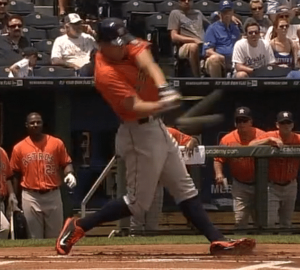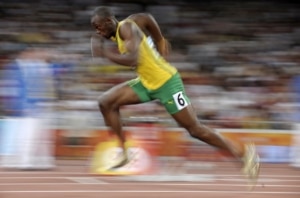George Springer: Can Gravity BOOST Power?
Could the Forces of Gravity be the Key to Unlock Power?
In this video, we’re comparing two athletes from two different sports, rookie outfielder George Springer of the Houston Astros and world record holding Olympic sprinter Usain Bolt. We’ll look at how gravity can affect energy transfer forces in human movement, and discuss:
- How-to transfer energy?
- How George Springer & Usain Bolt exploit the forces of gravity, and
- Can Springer be more efficient at transferring energy?
How-To Transfer Energy?
Albert Einstein once said,
“Energy cannot be created or destroyed, it can only be changed from one form to another.”
According to this short PBS video on Circus Physics above, there are THREE forms that energy comes in:
- Potential (PE) – Gravitational potential energy, the potential to fall. Or the body’s make up of height, weight, and muscle mass. Non-moving. During motion, PE is zero.
- Kinetic (KE) – energy of motion. At rest, KE is zero.
- Elastic (U) – stored in the bar (acrobat video above) or in connective tissue found in the body.
Keep in mind that the total amount of energy does not change. It just takes different forms. There are hitter compensations that upset the natural flow and transfer of energy from body to barrel to ball. George Springer has a movement compensation, but before we get to that, let’s talk about…
How George Springer & Usain Bolt Exploit the Forces of Gravity
Let us now compare the use of Gravitational Potential Energy between the two athletes…
According to Dr. Serge Gracovetsky, Physicist, Electrical Engineer, and best known for his theory on spine engine mechanics, in an email conversation I had with him, said this about the relationship between gravity and spine engine mechanics:
“The coupled motion* has nothing to do with gravity. It works in space as well. It is a property of the spine or any flexible rod for that matter. But the interaction with gravity makes interesting results which are exploited by every sport.”
(*Dr. Gracovetsky is talking about the coupled motion of the spine. CLICK HERE and watch from the 2-6 minute mark for a graphical explanation)
Dr. Serge Gracovetsky also talks about when running, at heel strike, there’s a compressive pulse that’s NINE-times your body weight! As you see in the picture of Usain Bolt, his body is lifting completely off the ground and preparing to fall back to the ground, due to the forces of gravity. He’s exploiting these forces to transfer large amounts of energy into efficient motion (Kinetic Energy).
Check out this YouTube video titled “Usain Bolt – Science of Olympic Gold”, for more in-depth analysis (only 1 min, 54 secs long).
In my video, you’ll notice George Springer “get shorter” from the start to the Final Turn of his swing. There is one energy transfer leak going on though…
Can Springer be more Efficient at Transferring Energy?
Yes he can. The one glaring energy leak is in a front arm bar. In a past article, I talked about the science of spinning faster. This is definitely something that Springer can change that will optimize energy transfer from body to barrel to ball. Things he does really well:
- Ability to follow the pitch,
- Use of Gravitational forces and forward momentum, and
- Great angle back towards the catcher.
- Fix Late Swings Fast: 2025 Pitch Recognition & See-Decide-Swing Training for Youth Baseball Power Hitters - October 6, 2025
- Safe Youth Weighted Bat Training: Proven Overload/Underload Drills to Increase Exit Velocity in Games Starting Tonight - September 29, 2025
- AI Coaching Course 2025: Youth Baseball & Softball Practice Plan + Off-Season & In-Season Workout Builder Fast - September 23, 2025







Man Oh man Joey! … You don’t miss a trick do you? You understand very well that a player can try this, or that … but if you try to buck the forces of the universe you won’t get the results you desire – you can’t fight it. What’s the saying … “If you can’t beat ’em … sign ’em!”
Lol Bob 🙂 Some people think forward momentum is just reaching out with the front foot. But the hitter has to commit their bodyweight for the forces of gravity to work its magic.
That’s exactly right Joey.
Thanks Bob, how’s the season coming along for that man-child of yours?
He’s coming along nicely. He’s made some changes to his swing and his approach and it’s starting to click now. I’ll get some film of him and send it to you so you can have a look at what he’s up to now – I think you’ll approve. He’s been swinging a Marrucci CU 26, and an X Bat 2427 (both 32.5 drop 2 and made of maple), and he’s not completely convinced he likes them as much as his Bear Valley birch bat (which is a 32.5 drop 1). He’s hit some cannon balls with all of them (in the 400 feet area), but he seems to be able to barrel up better with the birch, or with hickory bats. He dropped one out in right center the other night at Butler Park in Trail that was easily 450, and that was with the birch bat. That was a grand slam, and he uncorked a nasty one in the similar range a couple of nights earlier with the CU 26 – so he hasn’t settled on any one style or type of bat yet … but it’s making him a better hitter going back and forth like that. He’s been incorporating all of your suggestions, and has it ever paid off for him. He’s a legitimate power hitter now – no question. Thanks Joey …
Dude Bob, 400-450 feet! And he’s only 14?! He’s going to be a beast. No wonder those scouts are on his tail already. I’m so happy for him. Just make sure you keep him an athlete first, then a baseball player. I can’t take all the credit…he has a father who’s supportive, a good listener, and knows quite a bit about efficient mechanics himself 🙂 Keep up the good work Quin!
It’s been a real challenge for him to get his swing to this point. I’m starting to believe that it’s true that some people can just hit baseballs naturally, and some can’t. That doesn’t mean that there’s no way to hit a ball that far unless it comes naturally, because anyone can learn, but it’s an incredibly hard task, and some people will just not be able to do it. Another thing that stops some people is ther fear of failure. Once you make the decision to become a power hitter, you have to forget being a contact hitter. Slowing the bat down to just make contact may make your coach happy, but you’ll never hit long balls. You have to commit to it and be prepared to strike out and fly out. Watching Quin over these past few years has made me aware of how that last 50 – 100 feet to get to 400 is the toughest hill to climb. It’s not that hard for kids to go from 150 to 250, then it’s pretty hard to get to 325 – but with sud par mechanics you’ll stop there, and never get that last 100 feet. The reason is that you have to swing the bat so fast, and hard, that with low level mechanics you’ll fall apart – unless you’re a giant and can just muscle it out. Quin is 5’11” and weighs 185, but what a swing he has. He can’t hit it 400 every time. He’s hit a ball in the 450 area 3 times, 400 about 10, and lots of balls in the high 300’s. Average hits for him when he squares up and gets a good whack at it are over 350, and he’s done that too many times to count. We do owe you a lot Joey. Quin has listened to everything you say, and to his credit he’s done the necessary work to be able to do what he can do. Thanks for taking an interest in him – you’re a good man … and a darn good hitting coach to boot!
Well I appreciate the compliment Bob. You have a motivated young man on your hands. Just keep fueling the fire. The journey is filled with frustration and disappointment, but to me, this is what makes the fight fun. Keep fighting the good fight and keep up the hard work. Before a sword can look like a sword, it has to be bent and tempered with fire. This is what hitting is all about!